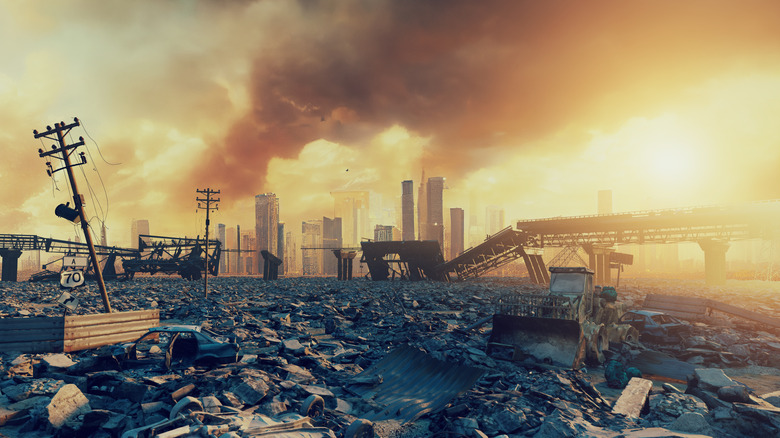Why 2026 Will Be The End Of World, According To This Scientist
Yep, it's that time again. It's time to play every doomsayer's favorite apocalyptic game: "What Way Will We All Die?" Is it nuclear weapons this time? Robotic and/or AI overlords? The disastrous consequences of climate change? The good ole' zombie horde swarming the land in search of living flesh? An inexplicable cosmic event expanding from the vacuum of space to consume not only Earth but the entire solar system — nay, the galaxy? Maybe an alien invasion? Nah. There are just too many humans.
Basically, that's what Austrian-American physicist and professor at the University of Illinois Heinz von Foerster thought. Born in Vienna, Austria in 1911, von Foerster got his doctorate in physics in 1944, wound up in the United States post-World War II, won a Guggenheim Fellowship, published some papers, made headways into the academic community, and developed a fascination with cybernetics, as the University of Illinois Archives tells us. He also founded the University of Illinois' Biological Computer Laboratory (BCL) in 1958 to study "computational principles in living organisms."
And what was this very clever person's take on the demise of humanity? As Time explains, he predicted that prosperity equals death. Assuming we don't blow ourselves up and our food supply remains intact, von Foerster pulled out a pencil and in 1960 calculated that humanity will be "squeezed to death" by 2026. Humanity will breed itself to oblivion.
8 billion mouths and counting
It's difficult in 2024 to look around and think that the human population will overwhelm the planet like ants in two years, especially if you live in a place like, say, Alaska. Sure, the number of humans skyrocketed through the 20th century from 3 billion in 1960 (when Heinz von Foerster made his apocalyptic prediction) to 8 billion at present, as Worldometer shows. One-thousand years ago there were only about 275 million humans alive.
That means that not only is the human population increasing, it's increasing more and more rapidly. This is true no matter what you've heard about decreased fertility rates over past decades, as sites like the World Economic Forum outline. The United Nations cites greater human survival rates into reproductive age as a major cause of our population boom. The United Nations also reports that the human population will reach almost 10 billion people by 2050, and over 11 billion by 2100.
More people need more food. Our World in Data shows that 46% of Earth's habitable landmass is already currently used for agriculture. Without ammonia — the foundation of nitrogen-based fertilizers — we wouldn't be able to feed almost half of the current population. Our reliance on ammonia makes it sound like we should worry about breakdowns in humanity's food supplies. But while von Foerster was concerned about such difficulties, they were more of a consequence of too much breeding.
Regulation of the body ... and fate
At this point there's no reason to be coy about what Heinz von Foerster meant in 1960 when he warned about an impending 2026 breed-pocalypse. He meant that there are just too many people having sex and producing too many little humans who grow up to do the same, even as all humans continue to live longer than ever. The solution, he thought, was something that's been around since the very year that he made his prediction: birth control.
In von Foerster's opinion, it was in our best interest to regulate our baby production. He wasn't talking about anything horrific like eugenics, but was thinking along the lines of his own expertise in the aforementioned "computational principles in living organisms." As Time quotes him, human behavior need not be reliant on any "external mechanism" to guide its future. "Since man's environment becomes less and less influenced by 'natural forces' and more and more by social forces determined by man," he said, "he himself can take control over his fate."
Von Foerster also advocated state intervention to keep the human population low. But rather than China's now-defunct "one-child policy," he suggested imposing taxes on families who have more than two children. However, it's easy to point out how the poorest among us would suffer most from such a move. Nonetheless, a high human population does make things more difficult for everyone — even if we won't be literally squeezed to death by 2026.


